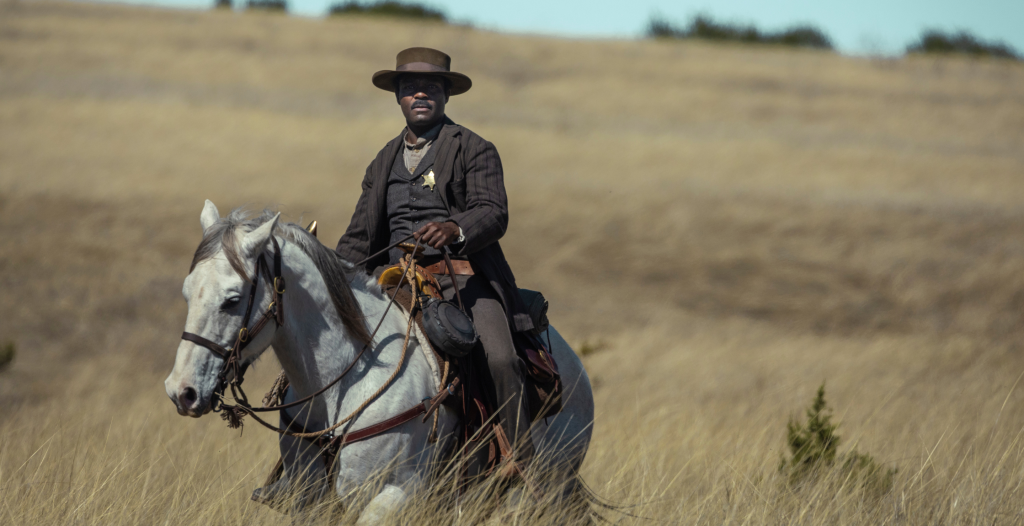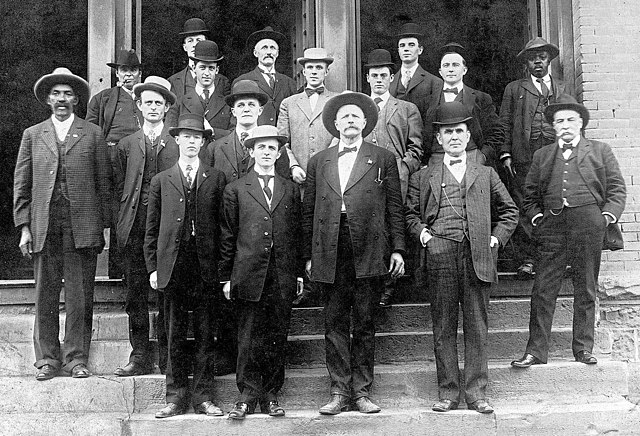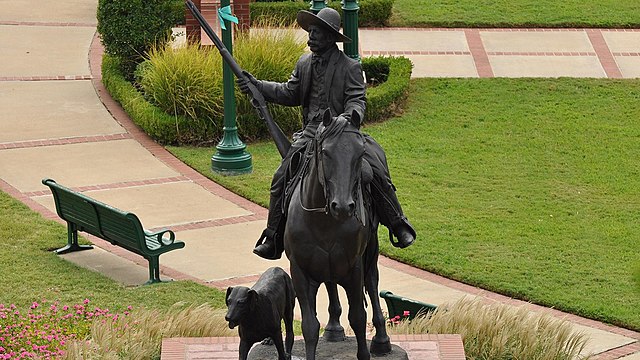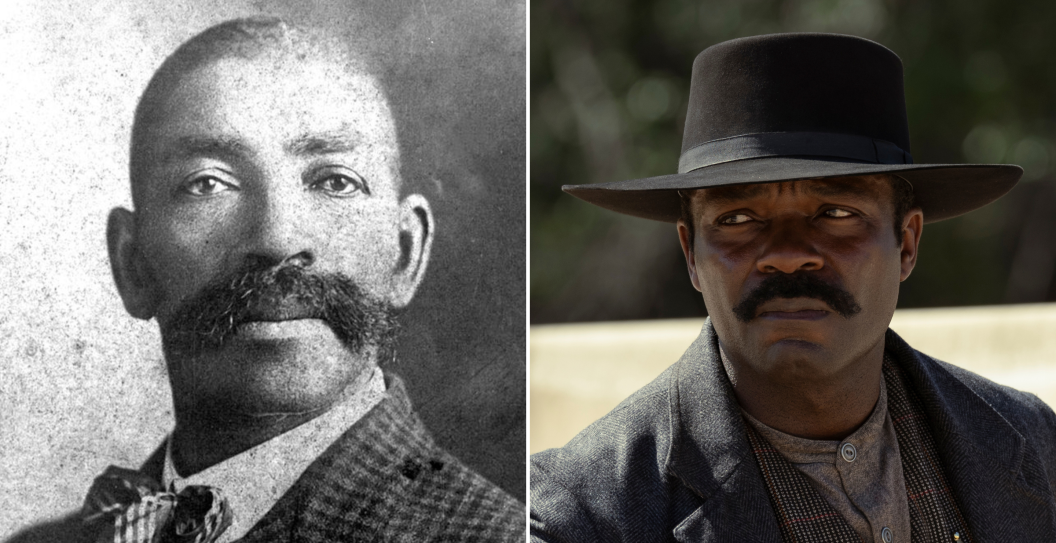In Gibson Station, a dusty settlement deep in Indian Territory, a posse makes its way through town, their boots a soft thud of worn leather on parched terrain. They're a diverse group of peacekeepers — whites, Blacks, Native Americans — a mix that would have been impossible anywhere but the Wild West. Bud Ledbetter, the leader of the posse, feels the warrant tucked into his jacket pocket.
There's movement at the edge of town. A man is sprinting across an open field — their man. Ledbetter, irate, orders the posse to shoot him dead. Pistols are raised. A series of sharp cracks sound as the guns discharge their ammunition. Plumes of dust erupt all around the target, but still he runs on.
Ledbetter turns his red, seething face to a tall Black man in his crew, who is accompanied by a sidekick carrying a satchel full of pistols. "Get him, Bass!" Ledbetter screams.
Bass replies in a calm yet deep and booming voice. "I will break his neck." He coolly raises his Winchester rifle and squeezes the trigger. The running man, now a speck disappearing a quarter of a mile away, falls to the ground, struck in the neck.
Bass Reeves escaped slavery and became one of the most incredible (and criminally lesser-known) heroes of the American West, beloved by his community and feared by outlaws. He racked up over 3,000 arrests during his career as a lawman and shot and killed as many as 20 criminals.
Due to the color of his skin, his life story never reached the levels of fame attained by other Wild West figures such as Jesse James or Billy the Kid (though some stories about Reeves claim he arrested them both). Being a Black man at this period made his achievements all the more remarkable, but it also relegated them to oral histories spread among the African American community. As such, the line between myth and fact is often blurred regarding his exploits.

David Oyelowo as Bass Reeves in "Lawmen: Bass Reeves." (Emerson Miller/Paramount+)
Helping to sing his largely unsung praises, a miniseries about the life of Bass Reeves premieres on Paramount+ this fall. Created by showrunner Chad Feehan (Ray Donovan) and executive produced by Yellowstone creator Taylor Sheridan, Lawmen: Bass Reeves will debut its eight-episode first season on Nov. 5.
In anticipation of the upcoming series, let's take a look at the fascinating and inspiring life of the real Bass Reeves.
From Slave to Gunslinger
Bass Reeves was born in 1838 and grew up enslaved in Texas. As a boy, he heard the Bible stories about Moses leading his people to freedom and was inspired, hopeful for a future in which he would be free. While working in his master's home, he pointed to a Bible and asked his master to teach him how to read. His master, George Reeves — knowing the power of words — rejected the young Bass' request but opted to reward the boy's curiosity by handing him a pistol instead.
George taught the young Bass how to shoot. And Bass was a prodigy. Noticing his talent, George took Bass to shooting competitions, where he won his master a considerable amount of money. But by 1859, as anti-slavery sentiment spread across the nation, Bass began to see a future where he could earn that money for himself.
When the Civil War broke out in 1861, Bass was around 21 years old. George joined up to fight for the Confederacy, and Bass accompanied him as a servant. While the two played cards one night, they became embroiled in a heated argument that escalated into a fistfight. Bass, in the prime of his life and strong from his time spent toiling the fields, beat George handily. Bass knew that a slave laying a hand on his master would punished by death and fled into the wilderness.
Bass in the Wild
Reeves escaped north into Indian Territory (now Oklahoma), where he lived among the Cherokee, Creek and Seminole tribes. The Native Americans taught him the land and how to live off it. He tracked, trapped and hunted wild game as they did. It was here he fell in love with a woman named Jennie, who was part Black, part white and part Native American. And as he stared into her eyes beneath the stars, they dreamed about a future where they could raise a family as a free people.
Some records state that he kissed his sweetheart goodbye and joined the Union Army, serving with the Indian Home Guard Regiment. He is said to have fought in the largest and most critical battle in the Indian Territory — the Battle of Honey Springs, where Union forces drove Confederate forces from the territory. Reeves' skill as a marksman had been put to the test, and he had emerged victorious. He was now a warrior.
After the war, he married Jennie, and the pair settled into a life as ranchers and farmers in Van Buren, Arkansas, where they would go on to raise 11 children. He would also serve as a guide for U.S. marshals in the area, making a substantial amount of money as a scout and tracker for the peace officers. His ability to speak multiple Indigenous languages and his knowledge of the land — which he once boasted he knew "like a cook knows her kitchen" — earned him a sterling reputation among federal court officials. When Judge Isaac C. Parker of the federal court was tasked with taming the wild territory and prepping it for statehood, Parker recruited Reeves, making him the first Black U.S. marshal west of the Mississippi.
His career as a legendary lawman had begun.

"Federal Official Family" pictured, with Bass Reeves at left. (Photo from Wikimedia Commons/Public Domain)
The Long Arm of the Law
Reeves was an imposing figure, 6-foot-2 and strong. And he was an absolute crack shot, ambidextrous and highly skilled in both the pistol and the rifle.
As the local papers chronicled his deeds, he quickly rose to celebrity status in the Indian Territory. He was especially revered as a beacon of justice for the Black community. He was known for taking down whites who lynched Blacks, and he famously apprehended the outlaw Jim Webb for the murder of a Black farmer, engaging in a shootout with Webb before striking him with his Winchester at 500 yards.
He would single-handedly bring in criminals by the bushel. Most lawmen would arrest one or two outlaws at a time. Bass would nab a dozen or more. Historian Arthur T. Burton shared just a few of his hauls: "The Fort Smith Elevator reported Reeves coming to town in August 1882 with 16 prisoners. The same newspaper reported Reeves in August 1883 bringing in 13 prisoners. The St. Louis Globe Democrat in February 1884 reported Reeves bringing in 12 prisoners to Fort Smith. The Fort Smith Elevator reported Reeves bringing in 12 prisoners in April 1884. The Arkansas Gazette in September 1884 reported Reeves brought 15 prisoners to Fort Smith. The same newspaper in March of 1885 reported Reeves bringing in 13 prisoners. The St. Louis Globe Democrat in October 1885 reported that Reeves had arrested 17 felons in the Indian Territory and brought them to Fort Smith."
Master Detective
Bass was a pioneer of undercover detective work. He once disguised himself as a beggar to hunt a pair of outlaw brothers who were hiding out at their mother's cabin. He approached the home with his pistol concealed under a long, tattered trench coat and had shot a hole through his hat to look the part. The brothers were apprehensive about letting the stranger into the cabin, but their mother insisted Bass come on in for supper.
The brothers' uneasiness eventually subsided and they all went to bed for the night, the brothers sharing a bed and Bass sleeping on the floor. When they heard Bass snoring loudly, the brothers permitted themselves to completely relax and drift off to sleep. They were awakened moments later to their hands having been cuffed and Bass, who had feigned his slumber, standing over them with a pistol drawn.
Bass was also among the first to use informants — friendlies embedded in the criminal underbelly who would keep him abreast of outlaw activity. He was famously friends with Belle Starr, aka "The Bandit Queen." Their collaboration was strange not only because she was a criminal but also because she was a former spy for the Confederates. He would eventually arrest Starr for horse theft, maintaining that even under the circumstances, she was "always a lady."
Bass is Arrested for Murder
While leading a band of incarcerated criminals across the territory, the chef in the crew — Bass' right-hand man — was shot in the neck. The bullet came from Bass' rifle, but Bass said the rifle went off by accident while he was cleaning it.
The chef was hospitalized when they returned to town but soon died from his injuries. The other men who were there vouched for Bass, insisting the killing was an accident, and no charges were filed. But two years later, when a former high-ranking Confederate officer began to split oversight of Judge Parker's stretch of territory, the charges were renewed.
After a hard-fought court battle, Bass successfully proved his innocence, largely due to all of the witnesses maintaining the same account of events since Day 1. Bass was also seen giving the chef first aid immediately after the shooting. Historians largely agree the shooting was indeed an accident, though some say it's somewhat suspicious the chef was shot in the neck — Bass always aimed for the neck.
Bass may have been found innocent, but bail and lawyer fees left him broke, and he was forced to sell the family farm. He and his wife soon divorced, their money problems exacerbated by Bass' monthslong treks into the wilderness in search of outlaws as well as the post-traumatic stress disorder he suffered from the Civil War.
He Arrested His Own Son
Bass' 3,000-person arrest log didn't hold any bias for people he knew personally. He famously arrested the pastor who baptized him, as well as his own son.
His son, Bennie, was wanted for the murder of his wife. And Bass reluctantly took the writ. While some historians argue this is a testament to his steadfast commitment to upholding the law at all costs, others say he arrested his son because he feared a different lawman might have shot his son dead. Bennie confessed to murdering his wife due to her infidelity and served 12 years behind bars. His sentence was commuted, and he lived the rest of his life peacefully as an upstanding citizen.

A statue of Bass Reeves in Ross Pendergraft Park, Fort Smith, Arkansas. (Photo by National Park Service/Public Domain)
The End of Bass Reeves and the Lone Ranger Myth
As an influx of Easterners moved to the Indian Territory and the land crept ever closer to statehood, the newcomers brought with them the racial tensions that had largely been absent from the territory thus far. The racial fluidity that had defined the region came to a close.
Judge Parker died and was replaced by John Henry Rogers, a former Confederate lieutenant who lacked the same impartiality regarding race and justice. Bass continued to serve as a protector of his community and arrested two men for murdering an interracial couple. But Rogers refused to hold the men accountable, and both were set free.
Despite his lifetime of loyal service and his legendary record, Bass was eventually relegated to being a beat cop in a poor neighborhood, where he was forced to arrest Black people almost exclusively. He worked well into his 60s and died in 1910 at the age of 71 — three years after the Indian Territory became a state called Oklahoma.
But the stories of his heroism were kept alive by the community he protected. Some historians argue Bass served as the inspiration for the Lone Ranger, citing his impeccable gun skills, detective work and use of disguises. While these claims haven't been proven (according to letters from the creators of the Lone Ranger, they pictured their character as a composite of Robin Hood and Zorro) Burton puts it best: "Bass Reeves is the closest real person to resemble the fictional Lone Ranger on the American western frontier of the nineteenth century."




